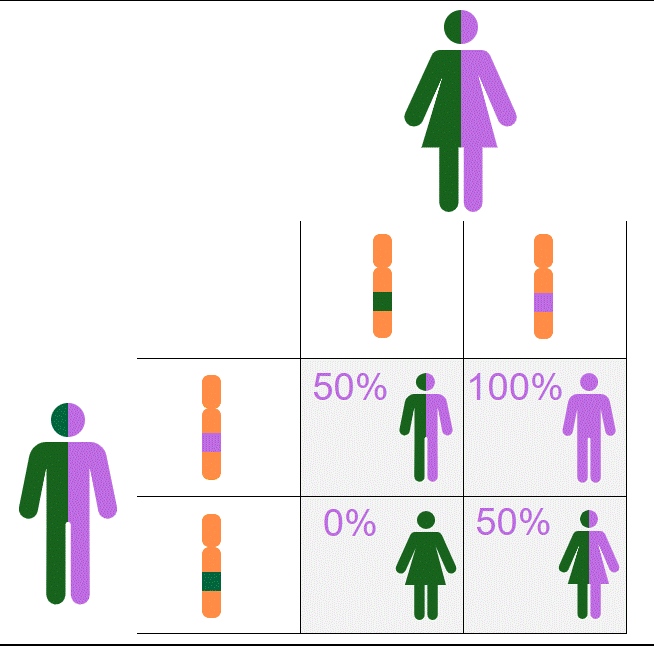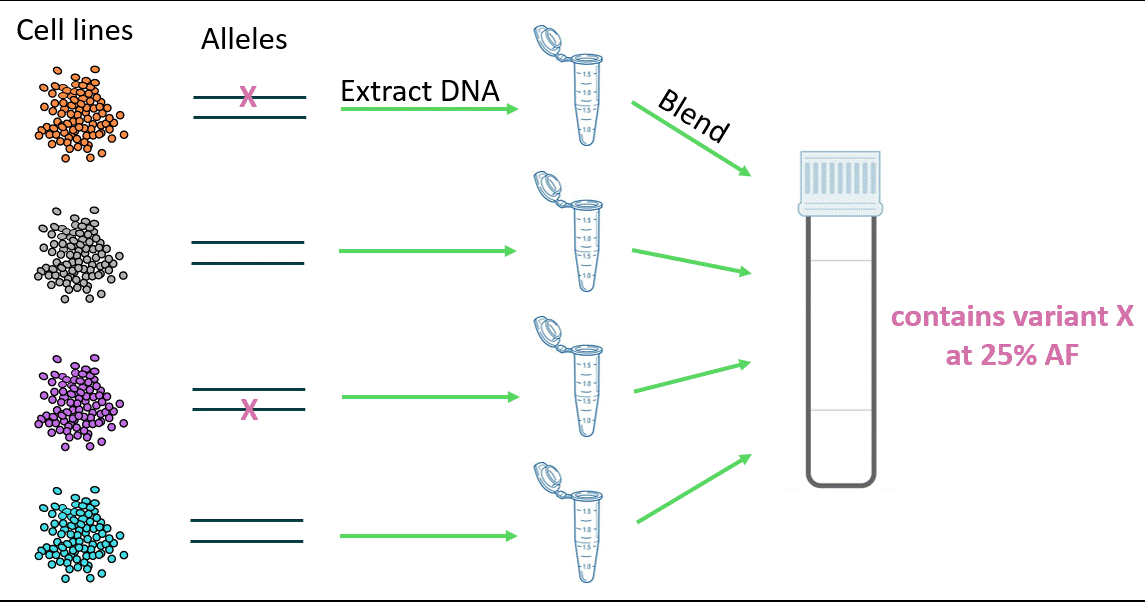Revvity molecular reference standards are available for both germline and somatic variants. In this article we cover why this distinction is important, and what it means for the allele frequencies of variants in these two types of controls.
What are germline and somatic variants?
Germline variants occur within the germ cells (the egg or sperm), or sometimes occur as novel mutations in the early zygote and are consequently passed to subsequent generations. If the germline variants are related to cancer, for example, then an individual who inherits them could have an increased risk of a cancer diagnosis. In contrast, somatic variants occur due to random mutagenic events during an individual’s lifetime. They can arise in any of the cells of the body, except the germ cells, so they are not passed down from parent to child. The occurrence of these variants in somatic cells can lead to cancer1.
How are germline and somatic reference standards different?
Germline reference material contains variants present at allele frequencies of 100%, 50%, or 0% as these are the only allele frequencies at which germline variants can occur. For example, two heterozygous parents, each with one wildtype allele and one allele with a germline mutation, could pass on two wildtype alleles, two mutant alleles, or one of each (Figure 1).

Figure 1. Two heterozygous parents both carry one wildtype allele (green) and one allele with a germline variant (purple). Their children can inherit both mutant alleles (100%), one of each (50%), or both wildtype alleles (0%).
Somatic reference material contains variants at lower allele frequencies. This reflects the relatively low abundance of these variants in vivo, and the variable frequencies at which they can occur.
All Revvity’s germline and somatic reference standards contain variants which are clinically relevant to the disease or condition of interest.
For example, certain germline variants in genes BRCA1 and BRCA2 have been associated with cancer2 and are directly responsible for its progression3 and some somatic variants can accumulate over the years increasing the chance of developing a variety of problems such as blood cancer4.
How are Revvity’s germline and somatic reference standards made?
The process for development and manufacture of germline and somatic reference material is the same. To best mimic naturally occurring variants, our reference standards are made starting with individual engineered cell lines from which DNA is extracted and precisely blended. The variants in each engineered cell line contribute to the allele frequency of the variants in the blended reference standard (Figure 2).

Figure 2. As part of the reference standard manufacturing process, DNA is extracted from cell lines, then blended. Two of the diploid cell lines are heterozygous for the variant “x”, so the blend of four diploid cell lines will contain the variant “x” at an allele frequency 25%.
Using DNA from cell lines means that each variant is in the context of the complete genome, with the genetic complexity that is expected of a patient DNA sample. With different formats available (including gDNA, FFPE, and ctDNA), Revvity’s cell line derived reference standards closely mimic patient samples – ensuring robust validation of NGS and PCR processes.
References
- Vogelstein B, Papadopoulos N, Velculescu VE, Zhou S, Diaz LA Jr, Kinzler KW. Cancer genome landscapes. Science. 2013 Mar 29;339(6127):1546-58. doi: 10.1126/science.1235122. PMID: 23539594; PMCID: PMC3749880.
- Kanchi KL et al. (2014) Integrated analysis of germline and somatic variants in ovarian cancer. Nat Commun. 2014;5:3156. doi: 10.1038/ncomms4156. PMID: 24448499; PMCID: PMC4025965.
- Chatrath A, Ratan A, Dutta A. Germline Variants That Affect Tumor Progression. Trends Genet. 2021 May;37(5):433-443. Epub 2020 Nov 14. doi: 10.1016/j.tig.2020.10.005.
- Van Horebeek L, Dubois B, Goris A. Somatic Variants: New Kids on the Block in Human Immunogenetics. Trends Genet. 2019 Dec;35(12):935-947. Epub 2019 Oct 24. doi: 10.1016/j.tig.2019.09.005.


